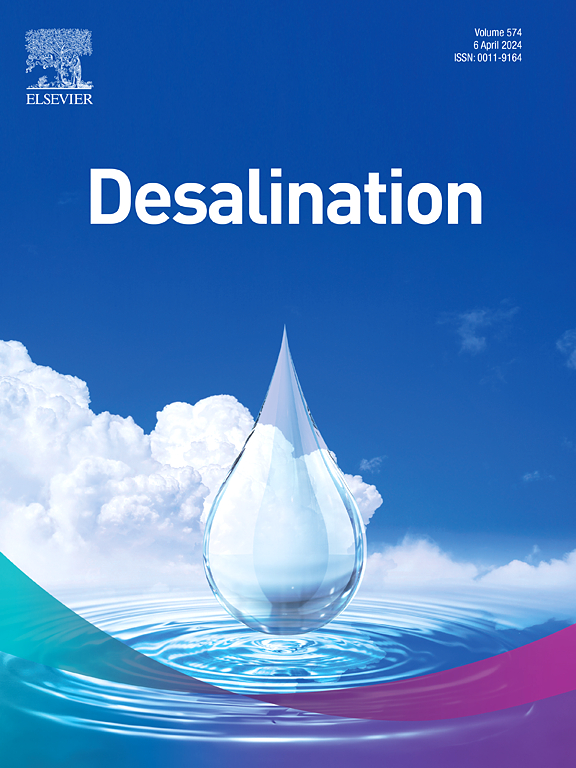一种用于超高通量染料/盐分离的基于柔性构建块的ph响应共价有机框架膜
IF 8.3
1区 工程技术
Q1 ENGINEERING, CHEMICAL
引用次数: 0
摘要
近年来,印染废水的净化已成为一项迫切的需求。在此背景下,共价有机框架膜(COF)具有低能耗、高效率、低维护成本和高经济效益等优点,有望成为废水中染料分离的理想材料。在这项工作中,通过界面聚合工艺成功制备了一种ph响应腙键合柔性构建块(FBBs)基COFs膜。系统表征分析表明,合成的膜具有良好的结晶度,具有柔性、连续性和自立性。有趣的是,它显示出极高的水通量1162.5 LMH/bar,并保持了良好的截留率。此外,该膜在不同pH值下表现出敏感的pH响应行为,呈现可逆变色,当pH值增加到12时,亚甲基蓝(MB)的去除率可提高到99.9%,揭示了“官能团相互作用和吸附”分离机制。本研究是基于fbs的COFs独立膜染料/盐分离的开创性开发,为开发新型功能膜提供了有益的信息。本文章由计算机程序翻译,如有差异,请以英文原文为准。

A pH-responsive covalent organic framework membrane based on flexible building blocks for superhigh-flux dye/salt separation
The purification of dyeing wastewater has become an urgent demand in recent years. In this context, the covalent organic framework (COF) membranes are envisioned as promising materials for dye separations in wastewater due to their advantages of low energy consumption, high efficiency, low maintenance cost and high economic benefit. In this work, a pH-responsive hydrazone bonded flexible building blocks (FBBs) based COFs membrane was successfully prepared via an interfacial polymerization process. Systemical characterization analysis demonstrated that the as-synthesized membrane exhibited good crystallinity with flexible, continuous, as well as self-standing properties. Interestingly, it showed an extremely high-water flux of 1162.5 LMH/bar and maintained good rejection rates. In addition, the membrane exhibits a sensitive pH responsive behaver showing reversible discoloration at different pH, and the rejection rate of methylene blue (MB) could be elevated to 99.9 % when increased the pH value to 12, revealing the “functional group interaction and adsorption” separation mechanism. This work is the pioneering exploitation in FBBs based COFs self-standing membrane for dye/salt separation, which may provide useful information for development of new functional membranes.
求助全文
通过发布文献求助,成功后即可免费获取论文全文。
去求助
来源期刊

Desalination
工程技术-工程:化工
CiteScore
14.60
自引率
20.20%
发文量
619
审稿时长
41 days
期刊介绍:
Desalination is a scholarly journal that focuses on the field of desalination materials, processes, and associated technologies. It encompasses a wide range of disciplines and aims to publish exceptional papers in this area.
The journal invites submissions that explicitly revolve around water desalting and its applications to various sources such as seawater, groundwater, and wastewater. It particularly encourages research on diverse desalination methods including thermal, membrane, sorption, and hybrid processes.
By providing a platform for innovative studies, Desalination aims to advance the understanding and development of desalination technologies, promoting sustainable solutions for water scarcity challenges.
 求助内容:
求助内容: 应助结果提醒方式:
应助结果提醒方式:


